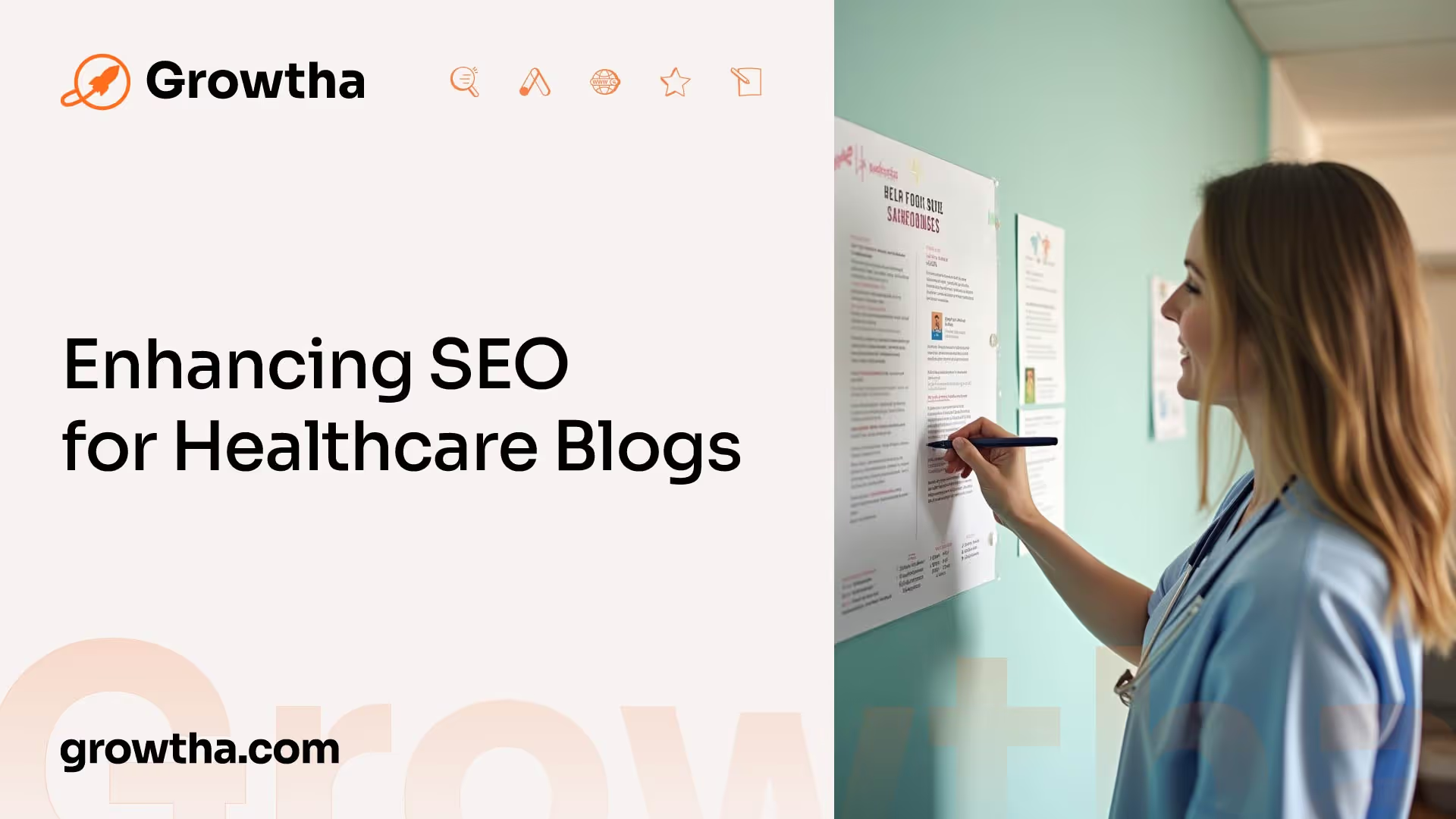Enhancing SEO for Healthcare Blogs
With 81% of people searching online for products or services, it is crucial for healthcare organizations to optimize their online presence to reach a wider audience.


Enhancing SEO for Healthcare Blogs
Importance of Healthcare SEO
In the digital age, the importance of healthcare SEO cannot be overstated. Medical SEO has become a necessity that should be part of every well-developed medical marketing strategy. With 81% of people searching online for products or services, it is crucial for healthcare organizations to optimize their online presence to reach a wider audience [1].
Necessity of Medical SEO
Patients and healthcare professionals frequently turn to search engines like Google, Yahoo, or Bing to find relevant medical information and services. By implementing effective medical SEO strategies, healthcare providers can ensure their websites rank higher in search engine results, making it easier for patients to find the information they need.
SEO for medical websites comes with unique challenges as there are additional regulations, policies, and important safety information to consider [1]. However, overcoming these challenges is essential to enhance visibility, attract potential patients, and establish credibility in the digital landscape.
Online Search Behavior
Before scheduling appointments, patients often search online for information about healthcare conditions and services. This emphasizes the importance of healthcare providers being a reliable source of accurate information that patients can trust [2]. By implementing healthcare SEO strategies, providers can optimize their websites to appear prominently in search results, increasing the likelihood of attracting patients who are seeking reliable healthcare information.
To fully harness the power of healthcare SEO, it is important to understand online search behavior and trends. Conducting thorough keyword research is crucial to identify the specific terms and phrases patients use when searching for healthcare information. By incorporating these keywords into website content, healthcare providers can improve their chances of ranking higher in search engine results and capturing the attention of their target audience.
By recognizing the necessity of medical SEO and understanding the online search behavior of patients, healthcare providers can enhance their online visibility, establish themselves as trusted sources of information, and ultimately attract more patients. In the following sections, we will explore the challenges in healthcare SEO and the elements of effective healthcare SEO strategies.

Challenges in Healthcare SEO
Implementing effective SEO strategies in the healthcare industry presents unique challenges that are not encountered in other fields. These challenges include regulatory considerations and the implementation of SEO strategies tailored to the healthcare sector.
Regulatory Considerations
Healthcare websites and centers of care must navigate additional regulations, policies, and safety information when optimizing their content for search engines. Compliance with these regulations ensures that accurate and reliable information is provided to patients, protecting their well-being and building trust in the healthcare organization.
To overcome this challenge, healthcare professionals and marketers must stay updated on the latest regulations and guidelines set by governing bodies. It is crucial to ensure that the content on healthcare websites adheres to these regulations while still optimizing for search engines. This delicate balance requires a comprehensive understanding of both the healthcare industry and SEO practices.
Implementing SEO Strategies
Implementing on-page and off-page SEO techniques is essential for improving search rankings and increasing organic visibility for medical websites [1]. However, healthcare SEO strategies must be tailored to meet the specific needs and goals of the industry.
An effective healthcare SEO strategy involves in-depth research, checking site health, identifying healthcare SEO keywords, and creating engaging content that is vetted by physicians [2]. This content should provide accurate and reliable information to educate and assist patients in making informed decisions about their healthcare.
Continuous monitoring, tracking, and adjusting of the healthcare marketing and SEO strategy are also crucial to reflect the evolving needs of patient populations over time. Staying up to date with the latest SEO trends and algorithms ensures that healthcare websites maintain their visibility and reach in search engine results.
Additionally, understanding the priorities and weaknesses of competitors in the healthcare industry can provide valuable insights and opportunities for improvement. Utilizing third-party tools to analyze competitor SEO programs can offer detailed information on important keywords and areas for optimization.
In summary, healthcare SEO poses challenges due to regulatory considerations and the need to implement tailored strategies. By staying informed about regulations, conducting thorough research, and continuously refining SEO efforts, healthcare organizations can overcome these challenges and effectively optimize their online presence to reach and assist their target audience.

Elements of Effective Healthcare SEO
To successfully optimize healthcare blogs and improve their visibility in search engine rankings, several elements of effective SEO must be considered. These elements include on-page SEO, off-page SEO, and local SEO.
On-Page SEO
On-page SEO refers to the optimization of various elements within a webpage to improve its visibility and relevance to search engines. For healthcare blogs, implementing on-page SEO techniques is crucial to attract organic traffic and target specific medical conditions, treatments, and services.
Key aspects of on-page SEO for healthcare blogs include:
- Keyword optimization: Conducting thorough keyword research and strategically incorporating relevant keywords into the blog content, headings, meta tags, and URLs.
- High-quality content: Creating informative, well-researched, and engaging content that addresses the needs and queries of the target audience.
- Proper use of headings: Organizing the content with clear and concise headings (H1, H2, etc.) to improve readability and signal the importance of different sections to search engines.
- Optimized meta tags: Crafting compelling meta titles and meta descriptions that accurately summarize the blog content and entice users to click through from search engine results pages.
- Image optimization: Optimizing images by providing descriptive alt text, compressing file sizes for faster page loading, and incorporating relevant keywords into image file names and captions.
By implementing on-page SEO strategies, healthcare blogs can increase their online visibility, attract organic traffic, and establish credibility with patients.
Off-Page SEO
Off-page SEO involves optimizing factors outside the website itself to improve its search engine rankings. In the context of healthcare blogs, off-page SEO plays a significant role in enhancing trust and credibility, ultimately attracting more patients.
Important components of off-page SEO for healthcare blogs include:
- Building high-quality backlinks: Acquiring links from reputable and relevant websites in the healthcare industry, guest posting on authoritative platforms, and utilizing online directories.
- Online reviews and ratings: Encouraging patients to leave positive reviews on platforms like Google, Yelp, and Healthgrades, as these reviews contribute to the overall reputation and credibility of the healthcare blog.
- Social media engagement: Actively engaging with the target audience on social media platforms, sharing valuable content, and fostering relationships to increase brand awareness and generate organic traffic.
By implementing off-page SEO techniques, healthcare blogs can enhance their trustworthiness, credibility, and online visibility, leading to increased patient traffic.
Local SEO
Local SEO is of utmost importance for healthcare organizations, as it enables patients to easily find services and specialists in their local area. Optimizing for local searches ensures that healthcare blogs appear prominently in search engine results pages for users searching for medical services in their specific location.
Key strategies for local SEO in healthcare blogs include:
- Creating location-specific pages: Developing dedicated pages that highlight the healthcare organization's services, specialties, and practitioners in specific geographic areas.
- Optimizing Google My Business: Claiming and optimizing Google My Business listings with accurate and up-to-date information, including the organization's name, address, phone number, hours of operation, and patient reviews.
- NAP consistency: Ensuring consistent and accurate NAP (Name, Address, Phone number) information across all online directories and platforms.
- Local content creation: Generating content that addresses local healthcare concerns, events, and news relevant to the target audience.
By implementing local SEO strategies, healthcare blogs can effectively target the local market, attract patients in their area, and establish a strong online presence within their community.
Optimizing healthcare blogs with on-page SEO, off-page SEO, and local SEO techniques is essential for improving search engine rankings, attracting organic traffic, and building credibility with patients. By considering these elements of effective healthcare SEO, healthcare organizations can achieve cost-effective marketing and long-term benefits.

Healthcare SEO Strategies
To optimize healthcare blogs and improve their search engine visibility, implementing effective SEO strategies is essential. Two key strategies for healthcare SEO are keyword research and implementation, as well as backlink building.
Keyword Research and Implementation
Keyword research is a crucial component of healthcare SEO. Creating a comprehensive keyword strategy allows hospitals and healthcare providers to reach their target audience within specific market areas. By focusing on specific services alongside overall keywords, healthcare blogs can effectively reach a wide range of potential patients [4].
When implementing keywords, it's essential to create SEO-focused landing pages that are tailored to specific services. These landing pages should incorporate top keywords related to the hospital's offerings. By doing so, healthcare blogs can effectively target prospective patients during their research journey [4].
Keywords should be strategically placed in high-value content, bundled to meet consumer needs, and used to educate healthcare consumers in order to build trust. Implementing a site-wide keyword strategy not only improves search engine rankings but also positively impacts those who visit the website. Hospitals should aim to use unique keywords that highlight their strengths, such as specialized services, to stand out among competitors. It is important to track and optimize the keyword strategy over time, utilizing tools and healthcare-specific service teams for advice and best practices [4].
Backlink Building
Implementing a backlink-building strategy is crucial for boosting the ranking of relevant healthcare information on search engine results pages (SERPs), building trust, and complying with Google's YMYL (Your Money or Your Life) guidelines. These guidelines refer to topics and pages that could have real-world effects on users, including healthcare. Backlinks from reputable and authoritative websites in the healthcare industry can help improve the credibility and visibility of healthcare blogs and websites.
Building backlinks involves acquiring links from external websites that point back to the healthcare blog or website. This can be achieved through various methods, including guest blogging, content outreach, and collaboration with other healthcare professionals or organizations. By obtaining backlinks from trusted sources, healthcare blogs can increase their online authority, improve search engine rankings, and attract more organic traffic.
It's important to note that backlinks should be obtained from relevant and reputable websites within the healthcare industry. Quality is more important than quantity when it comes to backlinks. Focus on obtaining backlinks from authoritative sources that are related to healthcare topics and have a strong online presence. This will help ensure that the backlinks positively impact the SEO efforts of healthcare blogs.
By incorporating keyword research and implementation, as well as backlink building, healthcare blogs can enhance their SEO strategies and improve their online visibility. These strategies help optimize content, attract the right audience, and establish credibility within the healthcare industry.

Enhancing Healthcare Website Visibility
To maximize the visibility of healthcare websites, implementing effective content marketing strategies and technical SEO optimization is essential. These two aspects work hand in hand to improve search engine rankings and attract a wider audience.
Content Marketing Strategies
Content marketing plays a pivotal role in healthcare SEO, as search engines value fresh, relevant, and informative content. Regularly updating a website with articles, blog posts, and other content not only signals to search engines that the site is active but also provides valuable information to potential clients.
When developing a content marketing strategy for healthcare, it's crucial to consider Google's E-A-T principle, which stands for Expertise, Authority, and Trustworthiness. Google's latest E-E-A-T update emphasizes the importance of showcasing Experience as well. To establish expertise, healthcare professionals should highlight their credentials and showcase their knowledge in the field [7]. Authoritative websites in the healthcare industry should provide credible and factual information, sourced from trusted studies and journals [7].
When creating content, healthcare brands should aim to strike a balance between educating and selling compassionately. While it's crucial to avoid sounding too salesy, focusing on pain points and addressing the needs of potential patients can provide natural opportunities to discuss products or services. Prioritizing blog post topics and SEO keywords based on conversion intent, rather than search volume alone, can drive higher-quality leads and sustainable conversions [8].

Technical SEO Optimization
In addition to content marketing, technical SEO optimization is vital to enhance the visibility of healthcare websites. Technical SEO focuses on optimizing the website's infrastructure and technical elements to improve search engine rankings.
Some key technical SEO considerations for healthcare websites include:
- Website Speed: Ensuring that the website loads quickly is essential for user experience and search engine rankings. Compressing images, minifying code, and leveraging browser caching can help improve website speed.
- Mobile-Friendliness: With the increasing use of mobile devices, it's crucial for healthcare websites to be mobile-friendly. Implementing responsive design and optimizing for mobile users can improve the overall user experience and contribute to higher search engine rankings.
- Site Structure and Navigation: Having a clear and organized site structure with intuitive navigation is important for both users and search engines. Properly categorizing content, using descriptive URLs, and implementing breadcrumb navigation can enhance the website's visibility and user experience.
- Technical Markup: Utilizing structured data markup such as schema.org can help search engines understand the content better. This can lead to rich snippets in search results, which can improve click-through rates.
- URL Optimization: Optimizing URLs by incorporating relevant keywords and making them descriptive and user-friendly can contribute to better search engine rankings.
By implementing these technical SEO optimization strategies, healthcare websites can improve their visibility in search engine results and enhance the overall user experience.
In conclusion, enhancing the visibility of healthcare websites requires a comprehensive approach that combines effective content marketing strategies and technical SEO optimization. By creating valuable and authoritative content while optimizing the technical aspects of the website, healthcare brands can attract a wider audience and improve their search engine rankings.
References
[1]: https://blog.madebyxds.com/medical-seo
[2]: https://avalanchegr.com/seo/healthcare-seo-strategy
[3]: https://blogs.perficient.com/2020/08/20/the-top-seo-challenges-in-healthcare/
[4]: https://webmdignite.com/blog/seo-hospitals-keyword-strategy
[5]: https://varnhealth.com/industry-insights/off-page-seo-for-healthcare-why-backlinks-are-important/
[6]: https://www.gethealthie.com/blog/seo-for-medical-practices
[7]: https://www.linkedin.com/pulse/content-marketing-strategy-healthcare-importance-google-
[8]: https://www.growandconvert.com/content-marketing/healthcare-content-marketing/







